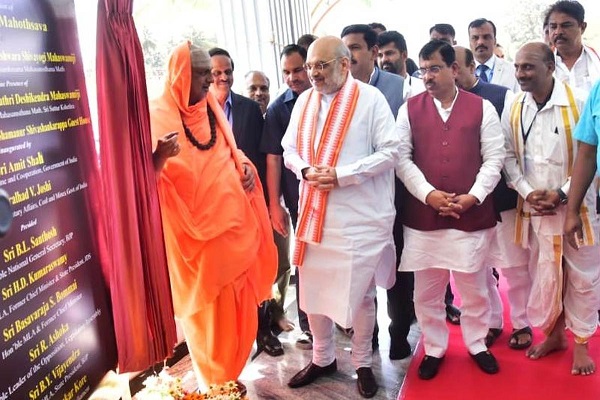GG News Bureau
Mysuru, 12th Feb. Union Home Minister and Minister of Cooperation Amit Shah graced the Suttur Jathra Mahotsav in Mysuru, Karnataka, on Sunday.
The event witnessed the presence of esteemed dignitaries, including Union Parliamentary Affairs Minister Pralhad Joshi.
In his impassioned address, Amit Shah underscored the pivotal role of Suttur Mutt in fostering the ethos of selfless service, work as worship, and charity. He lauded the unwavering commitment of the 24 saints who have presided over the Suttur Mahasamsthana Mutt throughout the centuries, emphasizing their contribution to humanity.
Highlighting the significance of the ongoing festival from 6th to 11th February, Amit Shah described it as a vital mechanism for reviving India’s rich cultural heritage. He emphasized the diverse array of events, including Rathotsav, Tapotsav, mass marriages, agricultural fairs, wrestling, and traditional games, encapsulating various facets of social life.
Praising the transformative initiatives undertaken by Jagadguru Shri Shivrathri Deshikendra Mahaswami, Shah commended the establishment of over 350 educational institutes under the mutt, catering to over one lakh students. Notably, he hailed the Polytechnic Institute established for Divyang students, a pioneering effort that reflects the mutt’s commitment to inclusive education.
Amit Shah also shed light on Suttur Mutt’s decision to establish a branch in Ayodhya, following Prime Minister Shri Narendra Modi’s consecration of the statue of Prabhu Shri Ram. He credited Prime Minister Modi for elevating India’s cultural heritage on the global stage through transformative projects like the Ram Temple in Ayodhya, Kashi Vishwanath Corridor, Mahakal Corridor, Baba Kedarnath, and revival of Badri Dham.
In conclusion, Shah emphasized Prime Minister Modi’s multifaceted approach towards ensuring India’s prosperity and safety while championing the preservation of Yoga, Ayurveda, and indigenous languages, thus securing the nation’s cultural legacy for future generations.


Comments are closed.